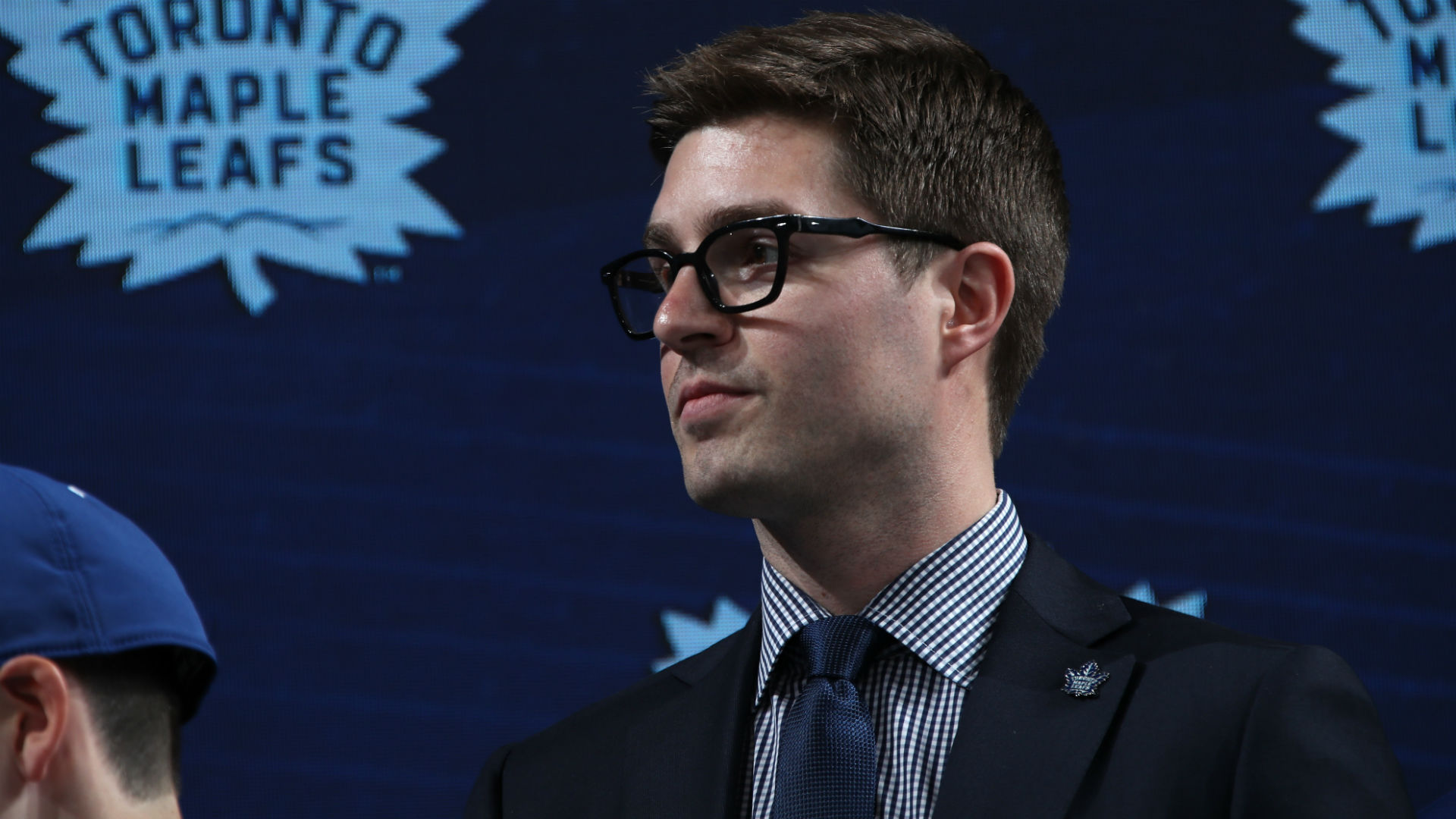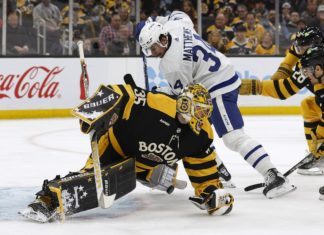Maple Leafs Hot Stove’s Alec Brownscombe joined The Battle of the Atlantic on TSN1200 on Saturday, discussing the Leafs’ recent run of mediocre play and the Kyle Dubas – Mike Babcock relationship.
On Mike Babcock and Kyle Dubas’ relationship
Brownscombe: The first thing I’ll say is that this was the most predictable narrative to emerge of all time. As soon as Dubas was named GM, I said to give it maybe 6 months and a Leafs losing streak before we hear that the two can’t get along and calls for Sheldon Keefe to take over. The fact that it was foreseeable doesn’t invalidate this story on its own, but it speaks to the fact that this was a narrative the media and fan base were always ready to stoke at the first possible sign of trouble.
The “old-school Babcock versus new-age Dubas” narrative has always been there bubbling under the surface. There is also a certain section of the fan base that views Dubas as their surrogate in the Leafs front office and they project all of their hopes, dreams and beliefs onto him — everything they believe, he definitely believes because he’s a progressive hockey guy who values analytics. Therefore, whenever they disagree with Babcock’s decisions, Dubas must also disagree with Babcock, and there is no way these two could possibly get along in the long run.
For my part, I’ll just say that healthy disagreement has been a part of the Leafs decision-making process in the front office for as long as Shanahan and Babcock and co. have been a part of it. It’s part of the culture they’ve sought to establish. And I haven’t seen much evidence presented in the 31 Thoughts article or otherwise suggesting it’s tipped over into something more to the point where it’s a marriage that’s now doomed.
I mean, we can go through it point by point quickly, if you want.
On the Sparks – McElhinney thing, which was one of the first divisions that were pointed to in that piece and in other discussions…
I could’ve told you there is no way Babcock was on board with the McElhinney-Sparks decision at the time because it was clearly not the best move as far as the short-term winning prospects, which is the coach’s only concern. McElhinney was a proven veteran who was at the top of his game at the time. Sparks was an unproven kid who wasn’t good for Babcock in 2015-16.
Put aside what I think of that decision personally, the GM’s job is to look out for the long view as far as the cap and asset management, and Dubas made the decision Sparks was the better route to take on those two fronts. I think that’s a pretty common coach vs. GM “conflict,” if you want to call it that, and I don’t think it’s remotely relationship-breaking. That’s a balancing act every team in the league and every coach-GM relationship faces when it comes to those kinds of decisions.
The Jake Muzzin trade quote has been really twisted and contorted to the point where it’s been suggested Babcock wasn’t a fan of the trade at all, which there is absolutely zero evidence for. I heard the scrum in full and he was asked a very specific, pointed question about how you make it work with five lefties and one rightie on the defense core. There was no alluding to whether the handedness affected his view of the player or the trade. It was specifically about how you manage a blue line unit with five defensemen who shoot left. Babcock said the only answer he could’ve said at the time — it’s not ideal, but we’ll make it work.
Why on earth wouldn’t Babcock be happy they added a good defenseman to his lineup for nothing but draft picks? There is not a coach in the world, regardless of what hand he shoots with, that wouldn’t be happy in that situation. They didn’t subtract anything from the roster and added a good d-man to help the team.
As far as the depth comment…. I can see one angle that it was a bit of a damning statement about the guys who have stepped into the lineup when players have gone down. It can’t have been a great vote of confidence for the Martin Marincins and Justin Holls of the world. In fairness to Babcock, these guys really aren’t good options.
But as far as the comment itself, putting aside the timing and the lack of confidence in those players, it is actually something Babcock has said repeatedly from the beginning of his tenure here. He says it all the time about how the organization is constantly looking to add depth and more depth in order to be an elite organization over time and get to the point where it’s next man up when injuries happen so that the team keeps rolling.
The other thing here is that Dubas admitted a few weeks ago he maybe wishes he added a depth piece on the blue line, but that it was ‘hindsight is 20-20’ with the injuries.
To then connect that with the tweet Dubas made hours later with the graphic that said, “Simple but wrong” one way and “Complex but right” the other way… It’s hilariously ironic and lacking in self-awareness on behalf of the reporter. There are much better odds that tweet was directed towards certain narratives in the media that have come out in the past few weeks than it is about the tensions between him and Babcock.
I don’t doubt there are tensions and disagreements like any front office has or good front office has. I’m not sure we are at all at a point where we can legitimately question whether Babcock and Dubas can work together.
On the team’s performance and poor record versus playoff teams
Brownscombe: I think it’s pretty simple. The Leafs have the depth of talent — the high-end skill and the depth — to beat up on mediocre competition. They’re just flat out more talented than a lot of teams and can blow games open on them.
When it comes to teams that also have good depth of talent and the Leafs don’t have a clear and obvious talent gap on them, things like your structure, your ability defend in five-man units properly, your ability to play a heavier game on the walls make all the difference. And the fact is the Leafs aren’t an elite team in those areas.
They play a chancey system that looks quite bad when it’s not executed well. They try to stretch the ice out and play a long game that takes advantage of their speed and skill. A lot of the time it does work and it really stresses teams and breaks down teams that can’t skate with them.
But it relies on having a good group of puck movers on the back end. Without Dermott and Gardiner, they don’t have that as much. I’d argue those are the best two stretch pass executers on their blue line.
They have two top-four defensemen right now and one of them, Jake Muzzin, is struggling a bit to adapt to this system and seems to not really know where his forward supports are going to be at any given time.
Their forwards flee the zone regularly as a systemic feature of what they do. They also don’t necessarily help that undermanned defense by playing a heavy down-low game on the walls with sustained o-zone time that can relieve some of the pressure. They do a lot of damage off the transition game and off of fast cycles that break teams down quickly. They don’t do a lot of the heavy down-low cycling that grinds down teams by winning the time of possession battle and wearing them down through attrition. When you’re doing more of that, you’re forcing the other team to dump and change and your defense’s life is a lot easier breezing out of their own zone.
It’s a bit of a house of cards when they’re out of sorts and missing some key puck movers on the backend. Add in that the goaltending has slipped a little the past few weeks, and that the Leafs forwards have kind of slipped at various times as far as their commitment to playing right and being on the right side of the puck defensively and taking care of details… that stuff starts to happen when you’re chasing games and you are stuck in a slump.
The other element is that the Leafs just weren’t playing desperate enough hockey there for a few weeks. They didn’t come out with much energy or urgency. Teams were coming out, many of them fighting for the playoff lives, and just looked way hungrier than them.
There is also a schedule element with the crammed schedule and the injuries and the flu bug that was working its way through the room. Add it all up and you have a recipe for a pretty poor stretch of results. But they’ve got a pretty easy run of opponents coming up that could help get them feeling good about themselves again here. It sounds like Dermott is getting closer; Gardiner is less clear. There’s still no reason to panic, but there is the sense that unless something changes in these next eight or nine games, they’re going to walk into a buzzsaw against Boston and it may not even take seven games for them to lose this time.
On what happens if the Leafs lose to Boston again
Brownscombe: I think Dubas expects the Leafs to win and thinks he’s put the team on the ice that is capable of beating that Boston team. I don’t think Dubas is going to overreact if they don’t. I think Dubas is keenly aware of the Washington example, the number of years it has taken a team like Tampa to break through… the amount of iterating and the amount of experience it often requires to get it done at playoff time. I highly, highly doubt it’s the end of Babcock, but I’d say he obviously enters next season in a less secure position, as any coach would after a first round exit following a top-five or so year in the regular season.
It also depends partially on how they lose — does the coach show the kind of uncreative problem solving that sinks them? Does he get out-coached by Cassidy? Do they get devoured by the Boston top line again with the Rielly-Hainsey pairing on the ice all series? Does he mix it up and find the right forward line and d-pair that can stem that tide enough so the Leafs can win the series?
We’ll see. There is a lot left to be determined and it feels like there is a lot of premature controversy being stirred up based on a presumed outcome of that Boston series right now. The games are played for a reason.


































